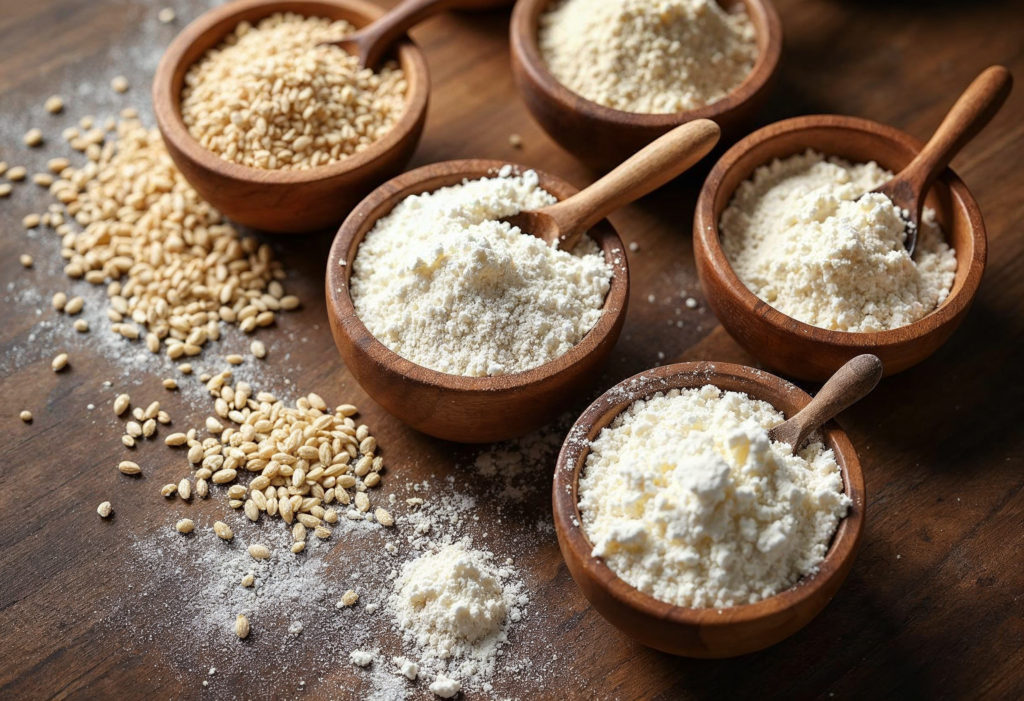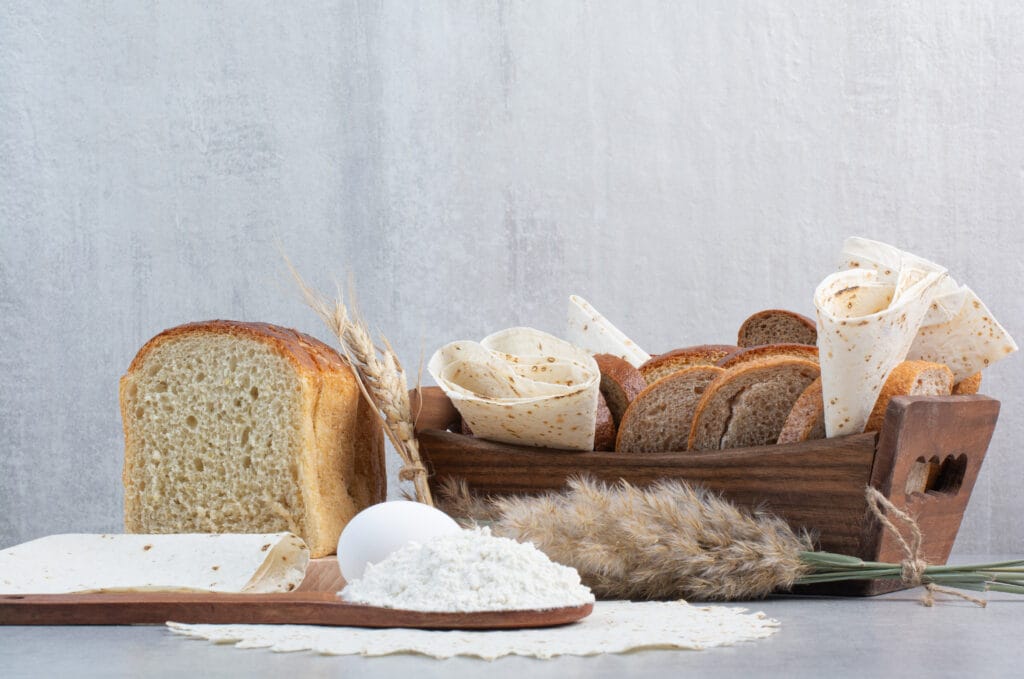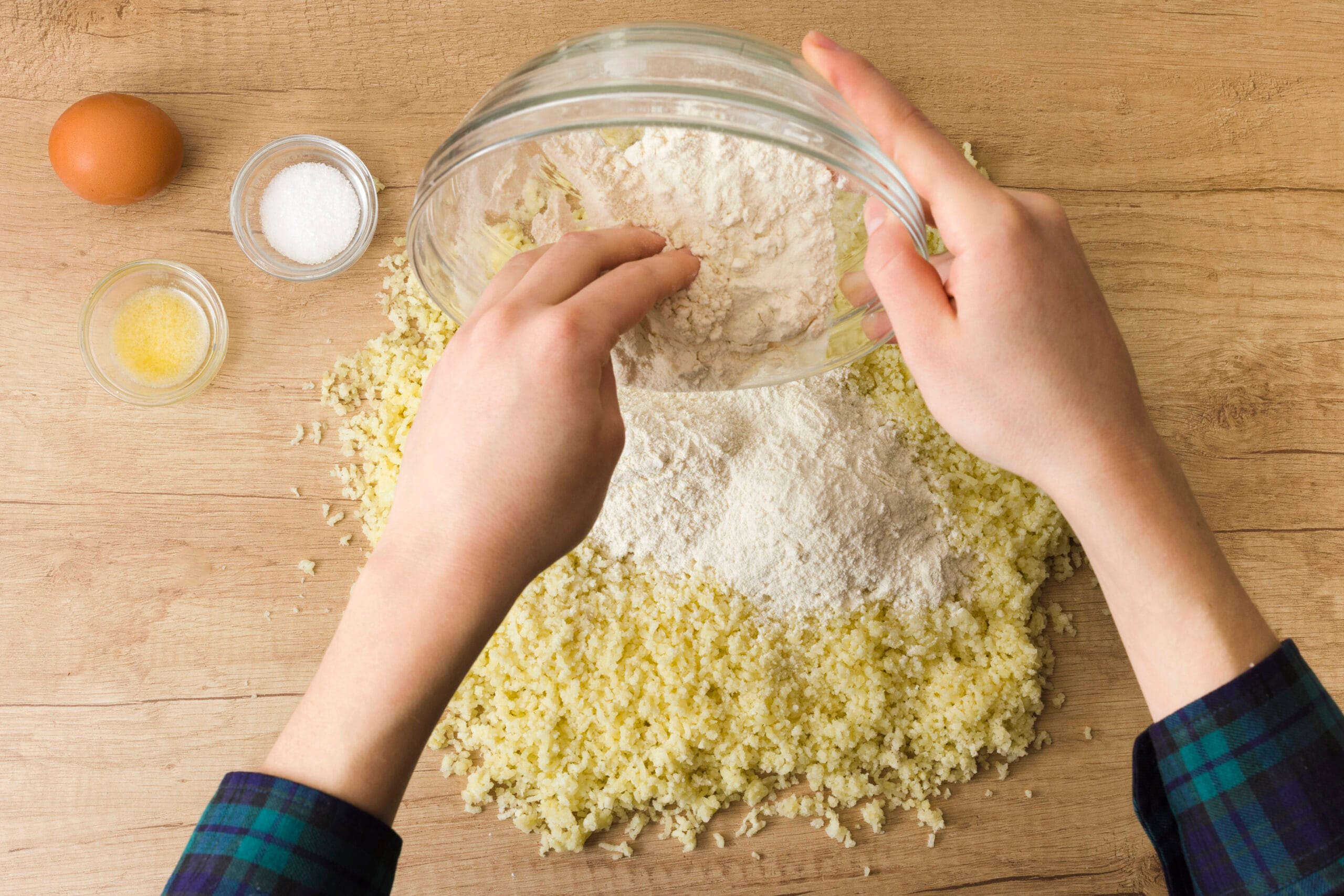Sourdough baking is a journey—part art, part science, and a whole lot of fun. But if you’ve ever dipped your toes into sourdough baking, you’ll know that the magic all begins with a starter. It’s the heart and soul of a perfect loaf, and the type of flour you use to feed it can make a massive difference. So, which flour is the best for a sourdough starter? 🥖
In this ultimate guide, we’ll break down why flour matters, explore different types of flour, and help you choose the perfect one for your bubbly, living sourdough culture. Whether you’re a total beginner or a seasoned baker, by the end, you’ll know exactly what flour to use for a lively and reliable sourdough starter.
Introduction to Sourdough Starter
Before diving into flours, let’s quickly get on the same page about what a sourdough starter actually is. Think of it as a tiny ecosystem: flour and water come together, wild yeast joins the party, and natural fermentation takes off. Over time, this little mixture becomes active, producing gas bubbles and that signature tangy aroma that bakers love.
Your sourdough starter is alive. It’s a living, breathing organism that needs the right “food” to thrive—flour. The flour you choose will directly affect the starter’s health, activity, and even the flavor of your sourdough bread. So, the stakes are high here!
Why the Choice of Flour Matters for Sourdough Starter
You might be thinking, “Flour is flour, right?” Well, not exactly. The type of flour you use plays a big role in how your starter behaves. From the rise to the flavor and even the texture of your bread, everything starts with the flour you feed your starter.
How Flour Affects Fermentation and Activity
Here’s the deal: yeast and bacteria in your sourdough starter thrive on the nutrients in flour. Some flours, like whole wheat or rye, are rich in minerals and nutrients that supercharge fermentation. Others, like all-purpose flour, are a bit “lighter” in nutrients, but they’re consistent and easy to use.
If you want a super active starter that bubbles like it’s at a party, rye flour is your go-to. But if you’re after something mild and steady, all-purpose flour is more your speed.
“Your sourdough starter is like a pet—it needs to be fed well to stay happy and lively.”
Impact on Taste, Texture, and Baking Results
Flour doesn’t just feed the starter; it also influences the final loaf’s flavor and texture. Whole wheat flour, for example, adds a hearty, nutty flavor to your bread, while rye flour gives it a deeper tang. On the other hand, bread flour provides strong gluten development for a chewier, airier loaf.
Think of it this way: the flour you use in your starter sets the stage for everything that follows in the baking process.
Types of Flour for Sourdough Starter
Now, let’s break down the main players. Each flour has its pros and cons, and the right choice depends on what you’re looking for in your sourdough journey.
If you’re new to sourdough, you might also enjoy trying this whole wheat sourdough bread recipe to bake your first loaf. Whole wheat flour adds a richer, earthier flavor.
All-Purpose Flour: Pros and Cons
All-purpose flour is the most common flour for feeding a sourdough starter. Why? Because it’s cheap, easy to find, and predictable. It’s the jack-of-all-trades in the flour world.
- Pros: Readily available, budget-friendly, and produces a mild, versatile starter.
- Cons: Lower in nutrients compared to whole-grain flours, which can slow down fermentation.
If you’re just getting started, all-purpose flour is a solid choice. It keeps things simple, and you’ll have fewer surprises along the way.
Bread Flour: When to Use It
Bread flour is like all-purpose flour’s stronger cousin. It has a higher protein content, which means more gluten development. This makes your starter stronger and better suited for high-rising, chewy sourdough loaves.
- Pros: High protein promotes a vigorous starter and robust bread structure.
- Cons: Slightly more expensive and not always necessary for a basic starter.
If you’re aiming for big, beautiful holes in your sourdough crumb (those airy pockets that bakers dream of), bread flour is your friend.
Whole Wheat Flour: Benefits and Challenges
Whole wheat flour is packed with nutrients because it includes the bran, germ, and endosperm of the wheat grain. This makes it a powerhouse for sourdough starters.
- Pros: Provides lots of nutrients for a very active starter; enhances flavor.
- Cons: Heavier flour can make the starter denser and sometimes harder to manage.
Using whole wheat flour can supercharge your starter in its early days, but it can be a bit tricky for beginners. Many bakers mix whole wheat flour with all-purpose flour to get the best of both worlds.
“Whole wheat flour is like a turbo boost for your sourdough starter, but you might need to balance it out for smoother results.”
For tips on balancing flavor and health in baked goods, check out how much sourdough starter to use for 500g flour. This guide will help you fine-tune your sourdough recipe.
Rye Flour: The Secret to a Powerful Starter
Rye flour is often considered the ultimate flour for creating and maintaining a sourdough starter. Why? Because it’s absolutely packed with nutrients and enzymes that yeast and bacteria love.
- Pros: Creates a super active, bubbly starter; adds deep flavor to your bread.
- Cons: Not as widely available and can produce a tangier taste, which might not suit all bakers.
If you’re struggling with a sluggish starter, try feeding it rye flour. It’s like giving your starter a cup of coffee—it wakes it right up!
Specialty Flours: Spelt, Einkorn, and Other Options
Specialty flours like spelt, einkorn, or emmer are ancient grains that bring unique flavors to your sourdough starter. They’re great for bakers looking to experiment and add complexity to their bread.
- Pros: Unique flavors, rich in nutrients, and fun for experimentation.
- Cons: More expensive and less predictable than traditional flours.

Comparing the Best Flours for Sourdough Starter
So, how do these flours stack up? Here’s a quick comparison to help you decide.
Nutritional Content and Enzyme Activity
- Whole wheat and rye: High in nutrients and enzymes, ideal for a strong, active starter.
- All-purpose and bread flour: Lower in nutrients but predictable and easier to manage.
Fermentation Strength: Which Flour is the Most Active?
Rye flour wins the crown for creating the most active fermentation. Whole wheat comes in a close second, while all-purpose and bread flour are steady and reliable.
Cost and Accessibility of Different Flours
- All-purpose flour: Cheap and widely available.
- Bread flour: A little pricier but worth it for strong gluten development.
- Whole wheat and rye flour: Affordable but less common in some stores.
- Specialty flours: Delicious but can put a dent in your wallet.
Common Problems with Flour in Sourdough Starter
A sourdough starter can sometimes act like a moody friend—one day it’s bubbly and happy, and the next it seems sluggish or lifeless. Often, the root cause lies in the flour you’re feeding it. Let’s explore some of the most common problems and their simple solutions.
Starter Not Bubbling: Causes and Solutions
So you’ve been feeding your starter for days, but it’s just sitting there, flat and unimpressive? Don’t worry—you’re not alone. Here’s what could be going wrong:
- The Flour is Too Weak: If you’re using all-purpose flour with low nutrients, the yeast may not have enough fuel to grow.
Solution: Add a boost by switching to whole wheat or rye flour. Even mixing in 25% rye flour can kickstart activity. - Starter is Too Cold: Yeast loves warmth. If your kitchen is cold, fermentation slows down.
Solution: Move your starter to a warmer spot—around 70-75°F (21-24°C) is perfect. - Infrequent Feeding: If you’re not feeding your starter consistently, it’ll struggle to stay alive.
Solution: Stick to a regular feeding schedule—every 12 hours if it’s at room temperature.
“A little rye flour is like rocket fuel for a sluggish sourdough starter—it works wonders to bring it back to life!”
Overly Acidic Starter: Why It Happens and Fixes
Ever opened your starter jar and been hit by a super sharp, vinegar-like smell? That’s a sign of an overly acidic starter. While a bit of acidity is normal, too much can stunt the yeast’s growth.
What causes it?
- Using whole wheat or rye flour exclusively (they ferment quickly and build acidity faster).
- Feeding your starter too infrequently.
Solution:
- Feed More Frequently: Refresh your starter more often to reduce the acid buildup.
- Switch Flours: Temporarily switch to all-purpose flour to mellow out the starter.
Inconsistent Results: How to Troubleshoot Flour Issues
Does your starter behave perfectly one day and refuse to rise the next? Inconsistency can be frustrating, but it’s usually a simple fix.
- Problem: You keep switching flours. Your starter needs time to adapt to changes in its “diet.”
Solution: Stick with one flour type for a week before experimenting. Consistency is key. - Problem: Flour quality varies. Not all flours are created equal. Cheap, over-processed flours may lack the nutrients your starter needs.
Solution: Opt for high-quality, unbleached flours. Organic options are even better because they contain fewer chemicals and more nutrients.

Best Practices for Feeding Sourdough Starter with Different Flours
Feeding your sourdough starter is like feeding a pet—it thrives on a balanced, consistent routine. Let’s look at some best practices when using different types of flour.
Switching Flours: Do’s and Don’ts
Thinking about changing up your flour? Go for it, but do it carefully. Here’s how:
- Do Mix Gradually: If you’re switching from all-purpose to rye flour, mix a small percentage of rye into your usual feeding. Slowly increase the amount over a few days.
- Don’t Switch Suddenly: A sudden change can shock your starter and slow it down.
For example, if you want to introduce whole wheat:
- Day 1: Feed with 75% all-purpose flour, 25% whole wheat.
- Day 2: Increase to 50% all-purpose, 50% whole wheat.
By day 3, your starter will have fully adapted to the new flour.
How to Test Which Flour Works Best for Your Starter
Not sure which flour your starter loves the most? Here’s a fun experiment:
- Split your starter into 3 jars.
- Feed each jar with a different flour (e.g., one gets all-purpose, one gets whole wheat, and one gets rye).
- Observe the bubbles, smell, and growth over 2-3 days.
The flour that produces the most active, bubbly starter is your winner!
“Testing different flours is like auditioning actors for a role. The one that performs best steals the show!” 🎭
Gluten-Free Flours: Can You Use Them for Sourdough Starter?
If you’re gluten-intolerant or want to bake gluten-free sourdough, the good news is—you can make a gluten-free sourdough starter. However, it comes with a few challenges.
Challenges of Gluten-Free Sourdough Starters
Gluten-free flours don’t have the same protein structure as wheat-based flours, so they behave differently during fermentation. This means:
- Your starter might ferment more slowly.
- It may require more frequent feeding to stay active.
Best Gluten-Free Flours to Use
If you’re going gluten-free, here are some flours that work well for a sourdough starter:
- Brown Rice Flour: A favorite for gluten-free starters. It’s mild, nutrient-rich, and ferments well.
- Sorghum Flour: Adds great flavor and is relatively easy to work with.
- Buckwheat Flour: Naturally gluten-free and very active for fermentation.
To create a gluten-free starter, follow the same process as a regular starter but use gluten-free flour and filtered water. After a week or so, you’ll have a bubbly, gluten-free culture ready for baking!
Expert Tips on Maintaining a Healthy Sourdough Starter
Once your starter is up and running, the key to success is regular maintenance. Here are some pro tips to keep it in tip-top shape.
How to Store Your Starter Based on the Flour Type
- If You Use Whole Wheat or Rye: These starters tend to ferment quickly, so store them in the fridge if you don’t bake often. This slows fermentation.
- For All-Purpose or Bread Flour: These are more stable and can stay at room temperature for regular feeding (twice daily).
Feeding Schedule for Maximum Performance
Consistency is everything. Here’s a simple feeding schedule to follow:
- At Room Temperature: Feed every 12 hours (morning and night).
- In the Fridge: Feed once a week to keep the starter alive and healthy.
If you notice your starter smelling off, bubbling less, or showing hooch (a layer of liquid on top), it’s asking for a feeding. Listen to it! 👂
FAQs About Choosing the Best Flour for Sourdough Starter
Sourdough baking often comes with a lot of questions, especially when it comes to the flour you use. Let’s clear up some of the most frequently asked questions to make your sourdough journey smooth and stress-free.
Can I Mix Different Types of Flour for My Starter?
Absolutely! Mixing flours is not only allowed but often encouraged. Many bakers combine different types of flour to balance nutrition, activity, and flavor. For example:
- A mix of all-purpose flour and whole wheat gives you a strong, active starter with mild flavor.
- Adding rye flour to all-purpose flour can supercharge fermentation while keeping things predictable.
If you’re experimenting, start with small ratios—like 20-30% of a new flour—and observe how your starter reacts.
Is Organic Flour Better for Sourdough Starter?
Organic flour is often a great choice for sourdough starters because it contains fewer chemicals and pesticides. These residues can sometimes interfere with fermentation or slow down the activity of your wild yeast.
While organic flour isn’t essential, it does have some perks:
- Higher nutrient content.
- More naturally occurring yeast and bacteria.
If organic flour isn’t available, don’t worry—unbleached, high-quality flour works perfectly fine.
“Think of organic flour as a premium meal for your starter—nutrient-rich and free from unnecessary additives!” 🌱
How Long Does It Take for a Starter to Adjust to New Flour?
If you decide to switch flours, give your starter a few days to adjust. It might slow down initially, but as it adapts to the new “food,” it’ll pick back up. A good rule of thumb is to feed the starter with the new flour for at least 3-5 consecutive feedings.
During this transition, keep an eye on:
- Bubble Activity: Is it rising and falling predictably?
- Smell: A healthy starter should smell tangy and slightly sweet, not foul.
- Consistency: If it’s too thick, add a bit more water; if it’s too runny, increase the flour slightly.
Conclusion: Choosing the Best Flour for Your Perfect Sourdough Starter
So, what’s the best flour for a sourdough starter? The answer depends on your goals and preferences:
- If you’re just starting out, all-purpose flour is reliable and beginner-friendly.
- For a super active, bubbly starter, rye flour is your best bet.
- Want to add some depth and flavor? Go for whole wheat flour or a mix of flours.
- For a strong gluten structure, bread flour delivers.
Ultimately, sourdough baking is all about experimentation. Don’t be afraid to try different flours and see what works best for you. Your starter is a living thing, and as you get to know it, you’ll figure out what keeps it happy and thriving.
Remember, the most important ingredient isn’t the flour—it’s patience. Give your starter time, care, and attention, and it’ll reward you with delicious, tangy loaves that taste like magic. 🥖✨
Final Recommendations for Beginner and Advanced Bakers
Here’s a quick cheat sheet to summarize the best flour options for sourdough starters based on your skill level:
| Baker Level | Best Flour Choice | Why It’s Great |
|---|---|---|
| Beginner | All-Purpose Flour | Easy to manage, consistent, and affordable. |
| Intermediate | Whole Wheat Flour | Adds flavor and nutrients; boosts starter activity. |
| Advanced | Rye Flour | Supercharges fermentation and enhances tangy flavor. |
| Experimental | Specialty Flours (e.g., spelt, einkorn) | Unique flavor profiles and fun to test. |
If you’re gluten-free, don’t worry! Start with brown rice flour or sorghum flour, and you’ll have a reliable gluten-free sourdough starter in no time.
“A great sourdough starter begins with the right flour, but it’s the love, care, and consistency that truly make it thrive.” 💛
Final Thoughts
Creating and maintaining a sourdough starter is a rewarding experience that connects you to centuries of baking tradition. By choosing the right flour and understanding how it impacts fermentation, you’re setting yourself up for success.
Whether you’re aiming for light and airy loaves or hearty and tangy bread, your starter is the foundation. So feed it well, experiment with different flours, and don’t stress about perfection—sourdough is a journey, and every mistake teaches you something new.
For more sourdough baking tips and flour comparisons, visit King Arthur Baking.
Now grab your flour, feed that starter, and let the magic of fermentation begin. Happy baking! 🍞👩🍳

